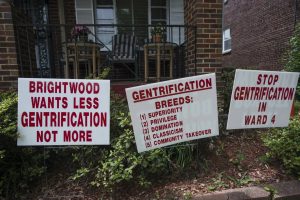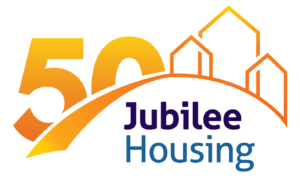
In an era of uncertainty, one thing is sure: D.C. is an expensive place to call home, and it’s only getting worse.
Gleaming, new development dots nearly every community as luxury condos and high-end rentals explode out of lots that once housed working-class families. Locally owned businesses are getting priced out by gentrification to make room for national chain stores. New residents flock to the city—about 800 a month—even as its economy remains largely dependent on the budgetary caprices of the federal government. What housing remains affordable is increasingly further away from the city’s core commercial districts.
The debate over D.C.’s fortunes as an en vogue place to live for people with high incomes will no doubt continue unabated. Meanwhile, a more immediate and impactful debate affects city residents who aren’t sure where they might end up next. Like many of America’s great cities, D.C. is in the midst of an acute housing affordability crisis that is forcing out many long-time residents.
As hundreds of new residents settle in D.C. each month, residents who have been here for generations are feeling unwelcome in the city they call home and are missing out on economic advantages, as the city prospers. Many D.C. residents juggle long commutes to jobs—sometimes two and three jobs—where they provide critical services to our communities, but don’t receive living wages.
Despite hard work and dedication, 60 percent of these residents come home to a house or apartment that costs more than half of their monthly take-home pay. Studies show some families in the D.C. area are getting by on less than $24,500, and after they pay rent and buy food, these families have little to no income left to put away for medical emergencies or a college fund or the rainy-day savings fund we all know we need but sometimes neglect.
Something’s got to give for these individuals who are already giving so much.
For more than 40 years, Jubilee Housing has provided justice housingSM to D.C. residents with very low to moderate incomes. Justice housing is high-quality, deeply affordable housing with nearby and on-site programming in resource-rich neighborhoods. Justice housing seeks to address the systemic and historical inequities that have left too many of our neighbors without access to the ingredients we all need to thrive.
• Providing deeply affordable homes—homes that residents are proud to call theirs—is the foundation. Housing stability can affect a person’s wellness. High-quality housing can alleviate both physical and mental stress, allowing residents to focus on the circumstances that bring them joy, from spending time with children to pursuing hobbies.
• Supportive services help residents on their paths to wellness, careers, college, and financial stability. Having a team of trusted, knowledgeable people ready to guidance opens new opportunities.
• Thriving neighborhoods offer conveniences that uncomplicate and enrich residents’ lives. Restaurants, grocery stores, art spaces, banks, doctors, and parks should be accessible to everyone—not just to those who can afford to pay sky-high rent.
Success—including future income, college attendance, and the probability of having a teenage birth—is directly tied to where a person lives, down to the city and ZIP code. In a world that feels increasingly small, it’s easy to forget how physical space both separates us and influences every decision and opportunity in our day.
That’s why Jubilee Housing has undertaken a bold, new five-year plan for justice housing, “Justice Housing in Action,” (see the lead story in this newsletter) to create inclusive, equitable communities with abundant opportunity.
We want longtime residents who’ve made D.C. a unique, vibrant community to feel like the city they cherish values them in return. In justice housing, every individual is respected and valued for the role they play in building a strong community. Families facing the greatest barriers—including those with the fewest assets—can live successful lives.
